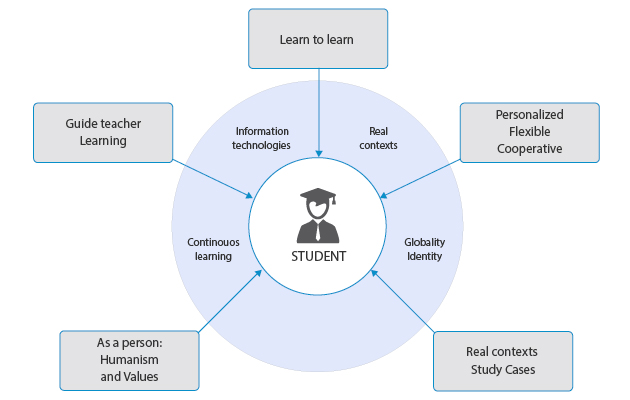Nowadays the educational models are composed of many educational and pedagogic innovations that facilitate, strengthen and promote a formative process of learn-to-learn in a quality learning environment.
Why on line education?
Educational and Pedagogic Innovation
Nowadays the educational models are composed of many educational and pedagogic innovations that facilitate, strengthen and promote a formative process of learn-to-learn in a quality learning environment. The goals are:
- To facilitate contact among students and professors, and between both groups.
- To promote cooperation and reciprocity; learning as a collective effort.
- To consider the student as the center of the process in which he or she participates actively.
- To stimulate and empower the continuous communication and interaction between professors and students.
- To inculcate that the formation process implies and demands dedication and continuous effort.
- To use motivation as a constant stimulus so that the student perceives that he or she can achieve the learning results expected.
- To customize learning, keeping in mind the differences between students and their diverse ways of learning.
Traditional and Online Elements
The educational model integrates and complements traditional and online elements:
- Printed study materials are delivered to the student´s home. The materials are of high quality and its contents are prepared by online education specialists. This guarantees the possibility of being able to study without depending totally on technology;
- A virtual Campus where experiences are shared with students of other countries, also access to FUNIBER’s electronic documents library, where there are hundreds of Theses written at the universities in the network, and digital documents of great value generated and updated according to developments in each country, university or business world. This is complemented with specialized discussion spaces by theme through forums and chat rooms. Together, these are an ideal complement of the compulsory study topics;
- Conferences and attending seminars given by our visiting professors so that the students become familiar with them thereby reinforcing the contact and learning networks,
- Continuous support from a specific and personal Academic Counselor/Tutor to advise and follow up with the student, in addition to the network of global tutors (our so called Map of Global Knowledge) who are specialized in different areas. Through experiences and international expertise they provide fruitful and enhance learning with; and
- Exams adapted to needs and formative requirements, in various formats that include online, traditional, distance, or even by telephone, that guarantees that the knowledge is assimilated and internalized according to the pedagogic objectives of each subject and complies with the demands of each country and university in the network.
The educational model was created by taking into consideration our pedagogic experience.
Online Components
In its online component, which controls a good part of FUNIBER’s educational activity, the educational model tries to promote a comfortable space for the student as characterized by:
- Elimination of the problems of incompatibility of schedules,
- Disappearance of the inconveniences of traveling,
- Continuous following of coursework through the campus and a personal or curricular agenda,
- Fitting of coursework in with individual interests and daily life (personal, familiar, work), and
- Application of acquired knowledge in a direct way in the work environment.
In-class Components
In its traditional component, which gives strength and distinction to FUNIBER’s educational activity, the educational model attempts to provide a secure space to the student yet not restricted exclusively to study through Internet access, characterized by:
- Formats have been specially designed to be applied to distance learning, beginning with a highly graphic design, with a clear and concrete writing style, frequent explanations, highlighting the most important points of each topic, personal and group self-evaluation exercises, combining personal “desktop” learning with collaborative virtual learning through the Virtual Campus.
- The course documentation follows a logical order, which is why all of the contents are coordinated in such a way that the concepts are introduced gradually. At the beginning, the objective is to know and understand essential concepts and their complex relation and then turn to theory or application according to each topic.
- The personalized advising allows for clarification of the matters that arise at any point in the list of topics. This consultations allow the student to have direct and indirect support, making it possible for the student to adjust his or her learning needs to specific consultants.
- Visiting Professors give conferences and seminars in different countries of the network, increasing the contact between countries.

